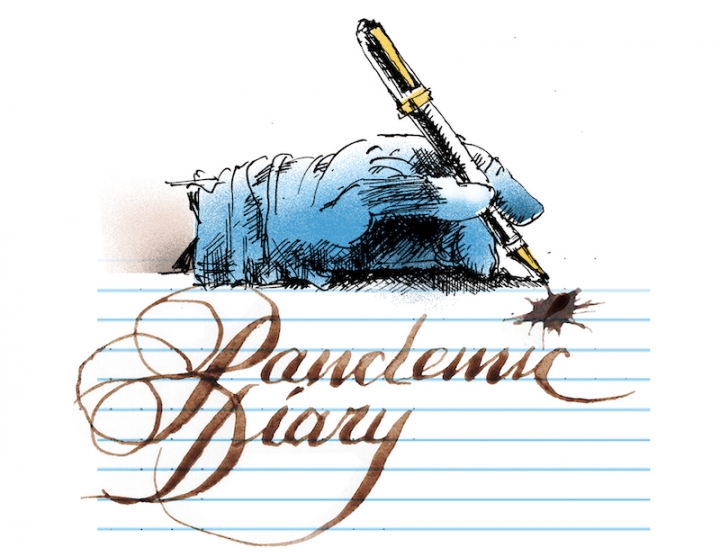
Tanya Howell: Ramadan is beautiful, even now.

Ramadan came at just the right time this year for nurse Tanya Howell, even if it has required some adjustments.
The ninth month of the Islamic calendar shifts by a few days every year. This year, the lunar month — and its required daily sunrise-to-sunset fasting — coincided with the Covid-19 pandemic and the new stresses it has unleashed.
The coronavirus unknowns — like whether she might contract the virus at work or give it to others — propelled her into a panic attack last month. Then she figured out how to adjust her family and community rituals to roll with Ramadan.
“That uncertainty builds up. When you can say that this is all in God’s plan, it replaces the fear with appreciating God. It’s calming,” Howell said.
Pray, Fast, Work, Eat

Contributed Photos
Howell’s prayer room.
Howell works as a registered nurse for the Cornell Scott-Hill Health Center. She has never found working and fasting a difficult combination. A veteran, Howell said that she was able to observe Ramadan while deployed in Iraq from 2003 to 2005.
Howell’s mother converted to Islam as a teenager. So Howell, her sister and five brothers all grew up fasting for Ramadan. They have stayed close, Howell said. If not for the pandemic, they would take turns hosting the iftar evening meal and would break fast together.
This Ramadan is more isolated. Howell’s family has issued a strict rule that no one is allowed to visit their mother, who has a low white blood cell count and can get sick easily, Howell said.
Instead of hosting iftar, Howell’s sister has cooked for her family. Howell picked up one of these homemade meals on a Sunday in late April on her way to work.

Howell and her daughter Sajdah Abdul-Karim, who is a sophomore at Montclair State University.
Howell usually wakes up at 3 a.m. to eat hot cereal for her morning meal and pray. She goes back to sleep after reading the Quran until noon. She said that she then wakes up again to shower, pray and get ready for work.
That Sunday, Howell stopped by her sister’s first. They chatted about something her sister had ordered online when Howell picked up her food, and then Howell drove to work.
The first step at work was to get her temperature taken. All staff members and patients go through this step first, and any patients who have potential Covid-19 symptoms get rerouted to the emergency department, Howell said.
Howell remembered that Sunday as a busy day at work, with three clients. She wears an N95 mask, a face shield and a gown these days as she admits each client, she said.
She described doing a full mental and physical health assessment of the clients. Clients come into the facility to get help for substance abuse, but they may need other kinds of medical attention, like antibiotics to heal a burning sensation while urinating, she said.
“This type of nursing is very rewarding to me This is a special population. It takes a lot for them to even come in the doors to ask for help,” Howell said.


Howell’s evening meal this Tuesday.
Howell would ask a coworker to cover for her when she breaks her fast at sunset, which is usually around 8 p.m. She was then able to dig into the meal her sister had prepared for her, which included a bottle of water, fried fish, brown rice, green beans, bread, and a slice of pound cake, she said.
If no patient needs her during her break, she lays out her prayer rug in the nurse’s office and prays.
Howell ends her shift after 11 p.m. Her husband, Michael, works the same hours as a state correctional officer. He is an “unconscious Muslim”, Howell said — meaning that he believes in God but Islam is not his chosen religion. Still, he painted Howell’s prayer room for her and often fasts with her, she said.
Time For Reflection

Normally, during the last 10 days of Ramadan, Howell gathers with other Muslims at the Abdul-Majid Karim Hasan Islamic Center on Dixwell Avenue. It is a festive time: Community members stay up all night together to pray, listen to lectures and read the Quran.
Now Howell is doing these activities alone, with an occasional FaceTime from a relative who wants to listen to the same lecture she does. Cornell Scott has allowed her take all 10 days off, so she is taking extra time during the day to clean, take walks with her husband and think about her faith.
“I’m missing everybody, not being able to hug each other and talk about how your Ramadan’s going. This year is different in those types of ways, but in a sense, it is beautiful, because it’s just you and God,” Howell said.